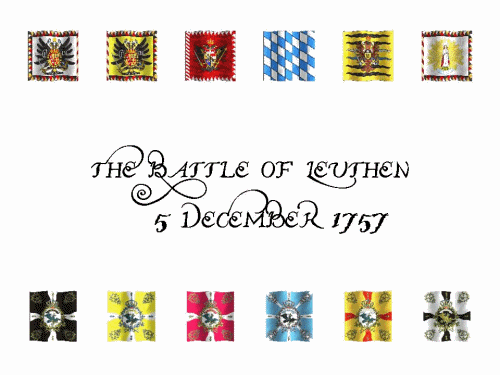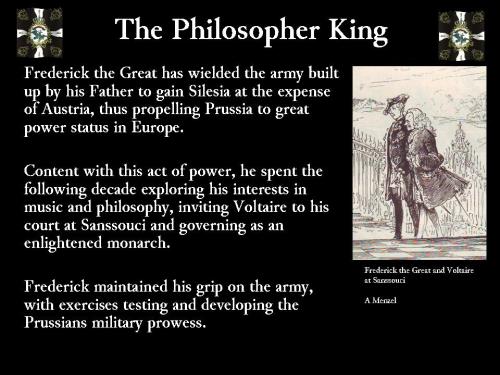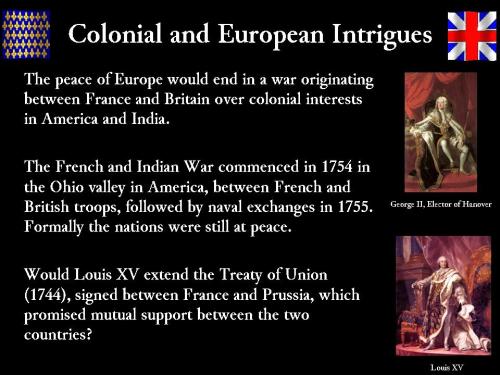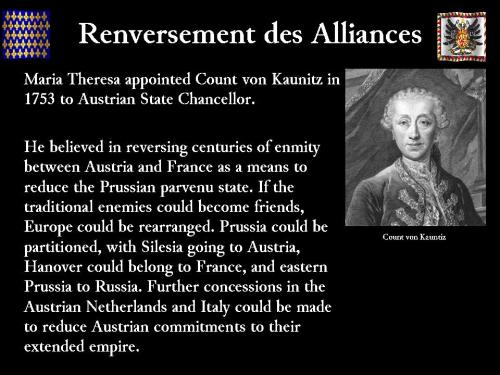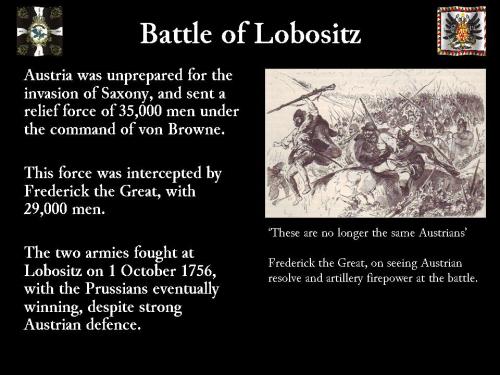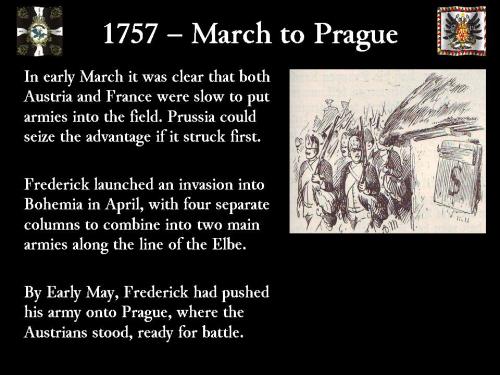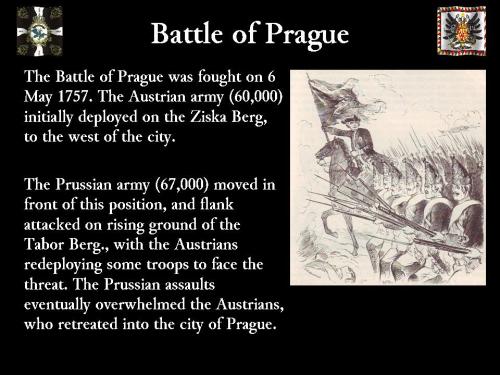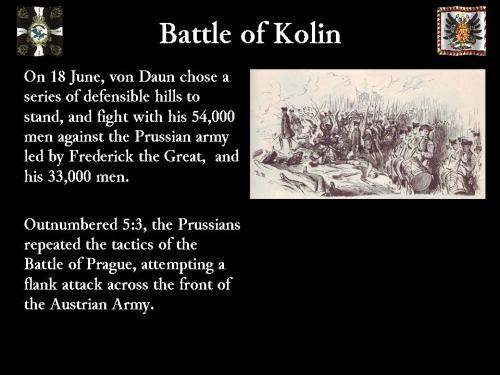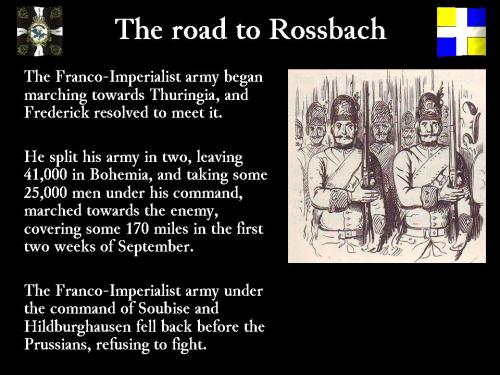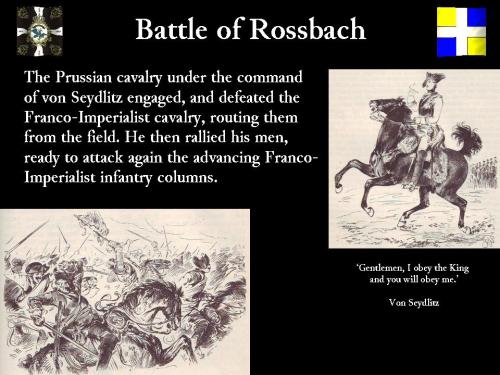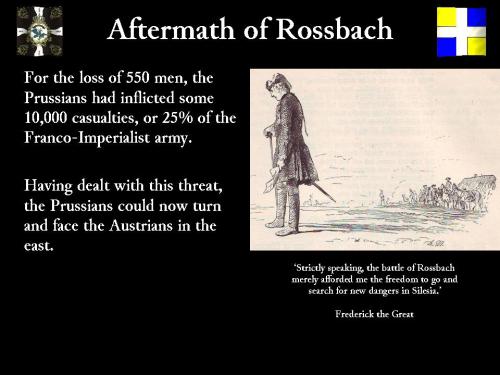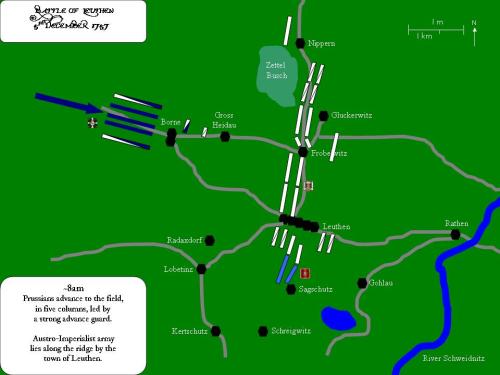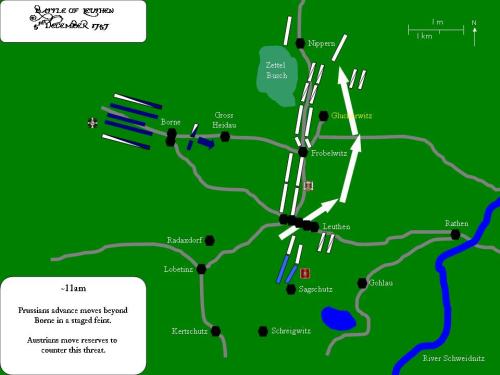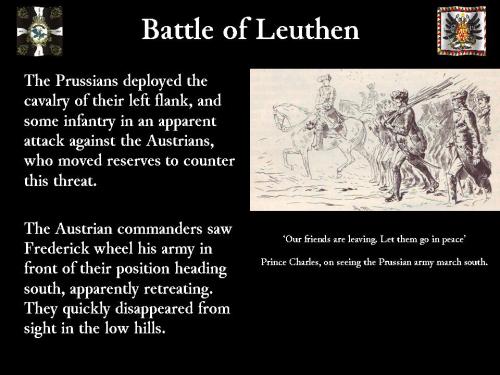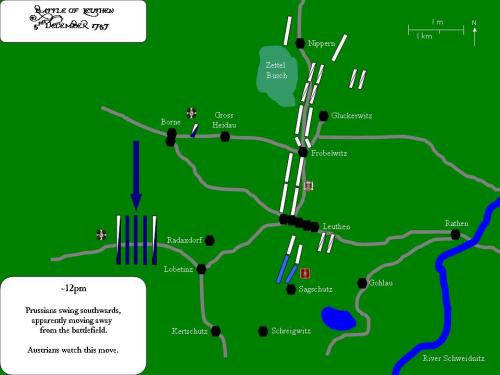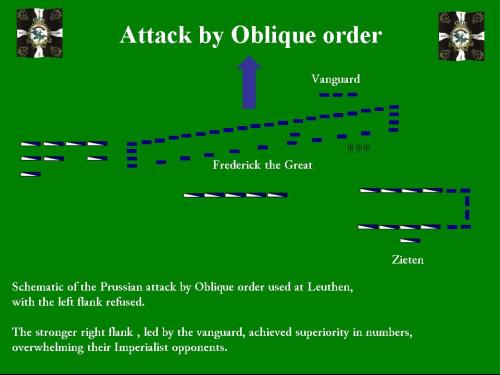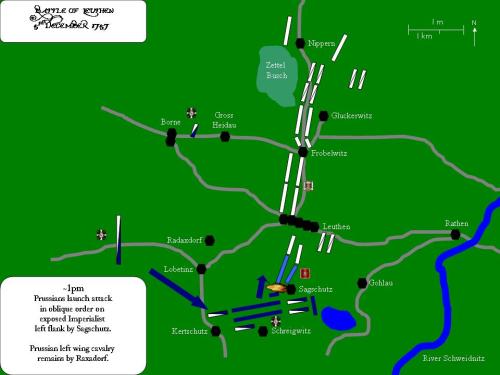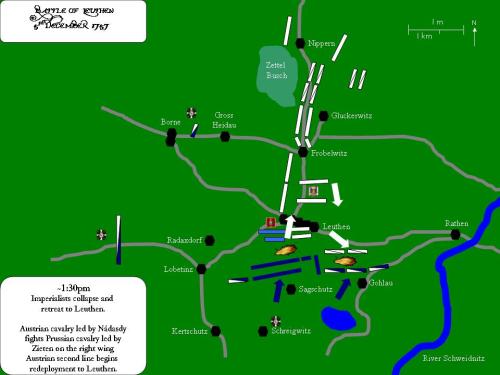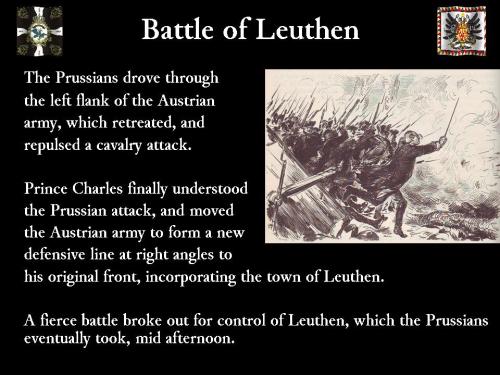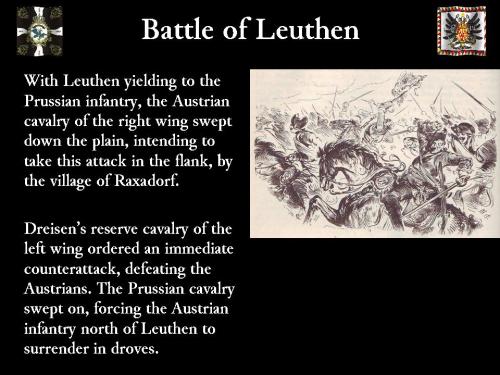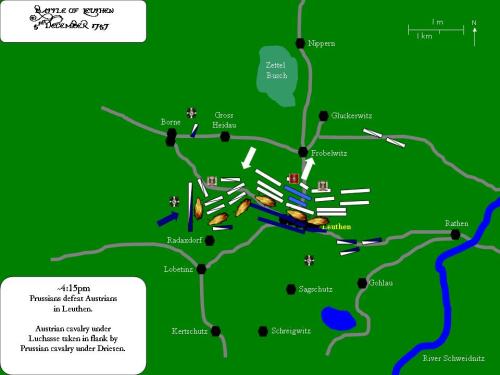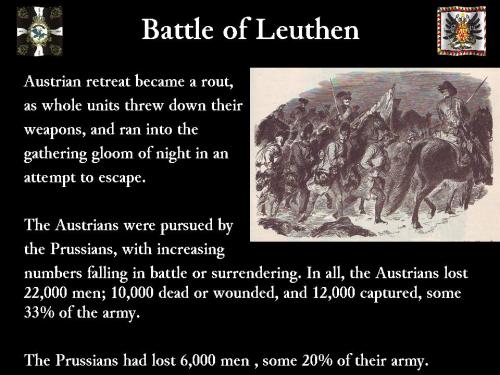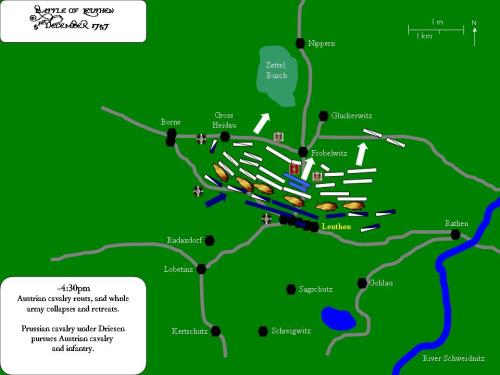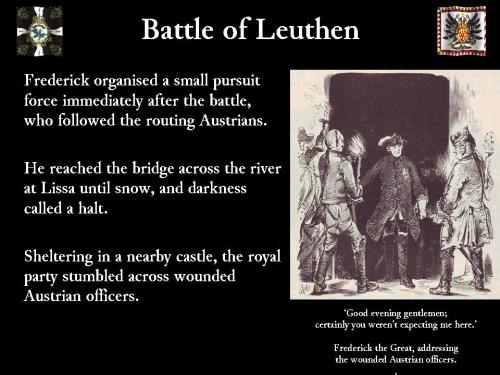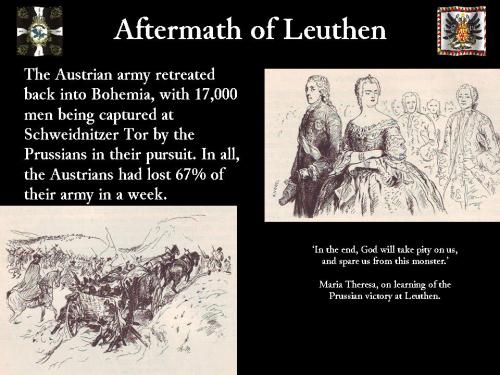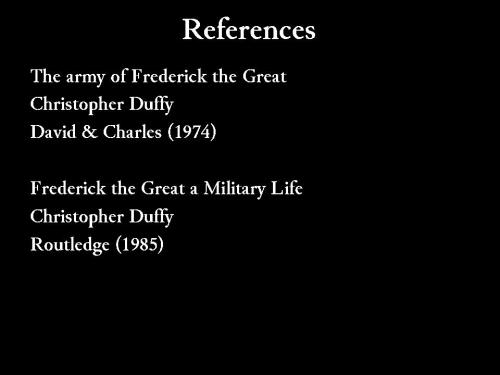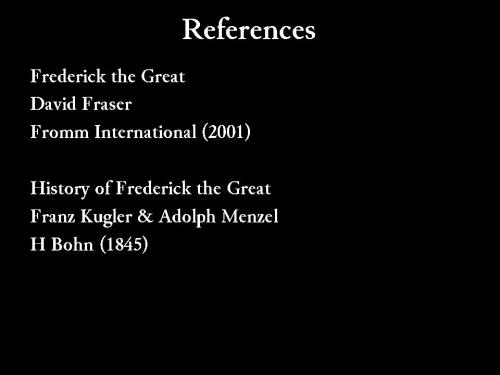



Song I
ILLUSTRIOUS Prince to whom ’tis given by fate,
To bear the burthen, and the pomp of state,
To reign of spacious realms the future lord,
To lift the balance, and to wield the sword,
O hear a Soldier train’d to War’s alarms,
Inur’d to danger, and grown old in arms,
With voice experienc’d shew the thorny road
Which leads thro’ scenes of blood to fame’s abode.
Nor arms, nor steeds, nor numerous troops, alone
Sustain the honor of the monarch’s throne;
Their use acquire, each maxim learn, that leads
The warrior’s skillful arm to glorious deeds;
My Muse shall here the various portrait trace,
And point the virtues which the hero grace;
His talents gain’d by toil, his mind serene,
His active courage, and his foresight keen,
Whose powers united in the Warrior’s heart
O’erleap the bounded limits of his art.
Yet think me not, malignant bard, inclin’d
To found pale Discord’s clarion to mankind,
That dazzled by false glory’s dangerous fire
I seek ambition’s fury to inspire,
Or wish to see your savage vengeance, hurl’d
With frantic boldness o’er a ravag’d world;
O may my hero boast: the honest fame
That waits AURELIUS’, TITUS’, TRAJAN’s name;
Then shine with noblest light triumphant kings,
When virtue owns the crown that valor brings,
Droops every trophy, withers every wreath,
That fell injustice blasts with poisonous breath!
O lovely Peace ! and thou thrice happy power,
Whose hands on PRUSSIA’s realm each blessing shower,
Far from our fields and tranquil feats, be driven
A Victor King, the heaviest: scourge of Heaven!
Could my low voice reach Heaven’s eternal throne,
Still should our fields thy blissful influence own.
Still should the labourer in our happy plains
Securely reap the produce of his pains,
And watchful THEMIS with impartial law
Protect the guiltless, and the vicious awe,
Our vessels give their canvas to the breeze,
And fear no dangers but from stormy seas,
And PALLAS o’er our peaceful throne preside
Her regis guard us, and her wisdom guide;
But should some neighboring power with causeless hate
Disturb our quiet, and invade the state,
Ye king’s! ye people! rouse to War’s alarms,
And Heaven shall aid their cause whom Justice arms.
Fierce god of war! to thee I tune the lay,
Direct my steps, and point the arduous way,
And you, AONIAN maids, assist my choice,
To gentle accents melt my rougher voice,
Temper with softer strains my Warlike fire,
And tune my trumpet to your peaceful lyre!
My daring mind would paths unusual trace,
And on PARNASSUS’ heights VICTORIA place,
While on the forehead of the DELIAN god,
Shall gleam the helmet, and the plumage nod;
My hand nor paints fair VENUS’ amorous wiles,
Her wanton blushes, and her witching smiles,
Nor shews the hero’s limbs inglorious laid
On fragrant roses ‘neath the myrtle’s shade;
Let PONTUS’ bard sing CUPID’s silken sway,
While listening graces love the tender lay,
My martial pen more horrid forms designs,
Stern VULCAN working ‘midst AETNEAN mines,
Where ponderous blows with dreadful art prepare
Those fell machines, the Thunderbolts of War,
Whose force, when skilful hands their power employ,
O’erturn the bulwark, and the town destroy,
Drive fighting legions to the realms of death,
And rule the fate of empires with their breath.
I’ll paint the cruel arm from BAYONNE named,
Where savage art a new destruction framed
Their powers combined where fire and steel impart,
And point a double wound at every heart.
Amidst the ranks, while death and carnage reign,
Calm moves the hero o’er the crimson plain,
Commands fresh troops the dubious fight to wage,
And shews the fatal tempest where to rage.
But ‘ere I open to the youthful heart
These parts sublime, the mysteries of the art,
First shall my precepts to the pupil’s sight
Unfold the easiest maxims of the fight;
So, ere the eaglets try the realms of air,
The parent’s wings her callow offspring bear,
Till bold by use, aloft they proudly rise,
And sail with dauntless pinion thro’ the skies.
Ye Warrior youths, impatient now to tread
The dangerous path of fate, by Honor led!
Torn from a weeping mother’s folding arms,
Untried in fight, and new to War’s alarms,
Think not with novice hand to seize renown,
Or pluck from Victory’s brow th’eternal crown;
Disdain not first to learn with ceaseless care,
Each nice detail, the Elements of War;
To forms of art your docile bodies yield,
With ready arm the weighty firelock wield;
Firm in your ranks in death-like silence stand,
And wait with watchful eye your chief’s command,
Quick at the word, in equal motions all,
Place in the threatening tube the murderous ball;
With steady footsteps wedged in close array,
Your ranks unfloating, rapid rush away;
Now halting, to th’allotted time attend,
While by platoons unnumber’d deaths you send;
Calmly, tho’ swift, (false haste will still retard),
March to the post your duty bids you guard,
Attend each signal of your leader’s hand,
Who knows not to obey will ne’er command;
With courage thus ‘neath valiant BADEN’s care,
Passed FINCK the hard apprenticeship of War,
When train’d for fight th’embattled cohorts stand,
The meanest soldier helps to form the band;
These are the limbs, and discipline the soul,
Pervades, informs, and regulates the whole.
So that VERSAILLES her silver streams may play
In watry columns to the face of day,
MARLY’s strong engines framed by nicest skill,
Make SEINE’s subjected waves obey their will;
Ten thousand various wheels, and pumps unseen
With blended powers compose the vast machine,
Each movement to the whole assistance lends,
Cord waits on cord, and wheel on wheel depends,
Fail but one rope, one pulley move no more,
The frame’s disorder’d, and the scene is o’er:
Thus in the host which glory leads to fame,
Should docile courage every breast enflame;
Valor that leaps o’er order’s sacred bound
Is often dangerous, always useless found,
Movements uncertain, rashly quick, or slow,
May blast the laurels budding on your brow.
Deem not the nice details of duty vain
They’re the first steps that lead to Vic’ry’s fame;
By service taught, and train’d in valor’s school,
Soldier yourself, you’ll soldiers learn to rule;
Form’d by degrees by Wisdom’s careful hand
The prudent leader of a valiant band,
Your steady thoughts will o’er its ranks preside,
Its daring march with temper’d ardor guide,
Teach it the various forms of fight to know,
And send unerring slaughter on the foe.
Rang’d in three ranks fair PRUSSIA’S hardy race
With dauntless front the adverse legions face;
With deeper files their foes, tho’ brave, in vain
Oppose their ardor, and dispute the plain.
Advance with equal pace the close-wedged line,
Let in the front the dreadful bayonet shine,
Attack with ardor, and reserve your fire,
So shall the astonished foe at once retire.
Your wasted troops must be supplied with care,
Mow’d down by slaughter in the field of War;
Chuse manly youths with sinews firm and strong
To share the glories of your veteran throng:
MARS loves the swain whose well-knit limbs can take
The heaviest burthens, nor his ranks forsake,
While feebler frames, by labor worn, and pain,
Shall sink beneath the weight of one campaign.
So proudly waving o’er the mountains brow,
Braves the tough oak the whirlwinds as they blow,
While by its sturdy side the wintry blast:
Lays with its rage the tender pine tree waste.
Thus shall new levies fill your daring train,
Strong as the shaggy brood of Libya’s plain.
If to renown your daring hopes aspire,
Of various troops the different use acquire.
To arms with which THESSALA’S heroes fought,
Join what their foes the active Centaurs taught;
Let a new PLUVINEL your coursers train,
To bear the soldier, and obey the rein,
O’er the wide trench with active limbs to bound,
To pass the rivulet, and to leap the mound.
On your strong breast the weighty cuirass wear,
And let your brows the galling helmet bear,
Learn with exactest art the sword to wield,
For oft rude force to active skill must yield;
This ready weapon gleaming in the hand
Shall terrify or break the hostile band,
Deal with resistless force its deaths around,
While MARS approving smiles on ev’ry wound;
But from the snorting steed, th’ ill-level’d fire,
Breaks your own ranks, nor makes the foe retire.
Teach your brave squadrons to perform with care
The various forms of fight, and modes of War,
To halt at once, to wheel in close array,
Nor from their neighboring troops to break away:
Let some experienc’d chief with careful art,
Speed join’d with order, to your line impart;
Teach it on every ground with ease to form;
Swift as the lightning, dreadful as the storm,
Shew it at once from pace sedate and slow,
To rush impetuous on the wond’ring foe;
To drive the adverse troops to rapid flight,
And sweep contending armies from the fight.
First bloom’d the laurel bough on GRAECIA’s soil,
Stern SPARTA taught the Warrior’s generous toil
While THEBES the close compacted fight begun,
And bade her phalanx glitter in the sun.
Illustrious chiefs of GREECE! your sage command
To heroes rais’d the meanest of your band;
Your skill the want of numerous hosts supplied,
And temperate valor vanquish’d PERSIAN pride,
While MARATHON and SALAMIS proclaim
To ages yet unborn the Grecian name.
Wondering, the MACEDONIAN Prince behold,
Proud of his friends, and lavish of his gold,
Wealthy in hopes, of Warlike Virtue vain,
He fights, he conquers, PERSIA’s trembling train;
Astonished ASIA shrinks beneath the blow,
And yields her riches to the approaching foe,
While by EUPHRATES stream his phalanx stood,
GRANICUS waves, and GANGES distant flood.
At length stern MAVORS from the eastern shore,
To ROME’s proud walls his bloody banners bore;
A Warrior nation frantic for alarms
Learn’d from the God himself the use of arms;
They dare their martial neighbors to the field,
And force opposing destiny to yield;
ITALIA’s states their growing power obey,
Bend to their mandates, and increase their sway:
By deeds like these their eagle used to soar,
New stretch’d her pinions to each distant shore;
ROME by her foes in all their arts was taught,
And learnt new ways to victory while she fought
Her strengthen’d camps all hostile inroads brave
and DANUBE trembled from his farthest wave.
Triumphant thus, her conquering bands subdued
IBERIA’s swains, GERMANIA’s hardy brood;
The painted sons of BRITAIN’s sea-girt shore
Lament their savage independence o’er;
Nor CARTHAGINIAN wiles, nor GRECIAN arts,
Nor GAULS vast limbs, nor PONTUS’ dauntless hearts,
Can check the progress of their arms, design’d
To rule the nations, and subdue mankind.
But when that Discipline, whose copious source
Supplied their legions with resistless force,
Beneath their later CAESARS ‘gan to fade,
A thousand barbarous hosts their realms invade,
More ruffian rage than Warrior art employ,
Each province ravage, and each town destroy,
Till nodding to her fall, the ruin’d state
Her ancient laws neglected mourns too late.
Now long the glorious Art unheeded lay,
Till CHARLES victorious call’d it into day:
The nations trembling at his warlike reign,
Beheld th’unconquer’d infantry of SPAIN
Reduc’d by ceaseless care to order’s law,
But doom’d to perish in thy fields, ROCROI.
Bursting those bands which long her sons had chain’d,
Arous’d by vengeance, and by MAURICE train’d,
BATAVIA bravely curb’d despotic sway,
And freedom gain’d by learning to obey;
By this illustrious Chief’s example fir’d,
The brave TURENNE to glory’s heights aspir’d;
He taught to GALLIA’S sons the Arts of War,
While LEWIS’prudent power enforc’d his care,
Shew’d discipline to rule with voice severe,
And awe rebellious discord into fear.
Mean while EUGENE, the favorite son of MARS,
Form’d for the fight, and doom’d in future wars
To stand firm bulwark of th’imperial throne,
Pass’d in his court unnotic’d and unknown.
From him DESSAW, then new to War’s alarms,
First learnt the toilsome rudiments of Arms;
Thus the fame powers on AUSTRIA’s realms who wait
Became the guardians of the PRUSSIAN state.
Mark how in every age this Art alone
Has fix’d the monarch, and maintain’d his throne;
If of this won’drous pile that mates the skies,
On Discipline the first foundations rise,
Let in your mind its vast importance live,
Which sage experience knows alone to give;
Woe to the novice who with frantic heart
Shall think, untaught, to try this dangerous Art:
Thus PHAETON, while headstrong passions fire,
Obtains the burning chariot from his sire,
His hands had ne’er the fiery coursers driven,
Nor knew his eyes the devious paths of Heaven;
He seized the reins, his horses start away,
O’er all th’ aethereal plains at will they stray,
Till struck th’impetuous youth by thunder’s force;
The hissing waves receive his blacken’d corse.
Rash youths be warn’d! the dangerous frenzy shun,
Nor tempt the timeless fate of PHAETON:
A ruin’d land shall mourn his hapless Wars·
Who guides too soon the fiery steed of MARS.

Song II
When fatal Discord from the realms of night,
Wings to this bleeding world her baleful flight,
Wakes with infernal cries her serpent brood,
Sheds thro’ the troubled air a fiery flood,
And bids invidious rage and fury dart
Their rankling poisons thro’ each monarch’s heart
Justice and Peace from mortal councils driven,
Forsake the earth, and seek their native Heaven;
Remorseless Vengeance every nation guides,
And brutal force in THEMIS seat presides;
Satiate with blood, yet thirsting still for more,
Proud of her first success, with savage roar,
The monster urges to the dangerous plain
Destructive War, and all her hellish train.
Then shine around the opening stores of MARS,
The ramparts guarded threaten future Wars;
On every anvil new-found weapons gleam,
And loads the darken’d sky a sulph’rous steam;
The spacious cities, whilom seats of ease,
With pleasure gay, and every art of peace,
Now swarm with crowding troops and glitt’ring arms,
All look destruction, and all breathe alarms,
While the shrill clarion chides the winter’s stay,
Whole tedious hours the promis’d War delay.
The season form’d to fan more pleasing fires,
Parent of blooming hopes and young desires,
When smiling Graces every flower combine,
The blooming wreaths of Love and Peace to twine,
Tempts only now to scenes of blood and death
The daring Warrior urg’d by glory’s breath.
Soft floats the air, and pours the melting snow
In silver torrents from the mountain’s brow;
O’er the fair vales the crystal currents glide,
And smiling herbage waits on every tide;
Verdant with rising corn the hills appear,
And laughing FLORA decks the vernal year;
The Warrior bands with vengeful arms supplied,
The fatal ministers of regal pride,
For glory eager, and of courage proud,
With wings of speed to honor’s standard crowd;
For the warm roof the tent its covering spreads;
Th’approaching War each trembling neighbour dreads;
Th’affrighted hind reluctant quit the soil,
And strangers reap the produce of his toil.
Now on the destin’d spot the martial train
Drawn up in dread array possess the plain;
The full battalions on th’appointed place,
With ready hands the growing city trace;
Here stretch the streets, and there the palace gate
Spreads to receive the guardians of the state;
Without or wood, or stone, with skilful hands
By soldiers rear’d, the canvas city stands;
Who, as the War requires, with ease pull down,
Bear off, and raise anew, the moving town.
It asks no vulgar mind, or trifling care,
To chuse the station and the Camp prepare:
Your troops in certain safety would you place,
The different ground with skill and prudence trace;
Here craggy mountains seem to pierce the sky,
There narrow dells and spacious champains lie;
Each, as occasion points or chance directs,
Assists your purpose, and your Camp protects;
On these selected well, and fixed with care,
Depends the fortune of th’approaching War.
The hardy troops whose steady march you lead,
The substance form of War, yourself the head;
Since from your thoughts their ev’ry motion flows,
Act while they rest, and watch o’er their repose;
To you each look the ardent warriors send,
Wait on your words, and on your skill depend;
With ceaseless care their confidence retain,
Nor let the soldier trust your power in vain.
Does your bold heart in bloody fields delight,
Resolved to try the dubious chance of fight?
Chuse for your daring Camp th’extended field,
Whose space shall room for every movement yield;
Small troops advanced before your army send,
Let woods, and rivers near, your Camp defend:
Protect the neighbouring towns with watchful eye,
Whose plenteous marts your valiant troops supply;
Let your brave bands at equal distance drawn,
Ranged in two lines, divide the verdant lawn;
Your foot the centre guard with steady ranks,
While your new-form’d dragoons protect the flanks;
The infantry with firm resistless force
Your body make, your arms the rapid horse.
Uncrouded squadrons there their files extend,
Active to charge, or ready to defend;
But in its proper place each corps employ,
Or ground unfit will all their power destroy.
Mounted on fiery steeds, the centaur train,
Who rush like lightning o’er the level plain,
Where swells in craggy heights th’uneven ground,
Or gloomy forests spread, are useless found,
While the brave foot in all alike remain,
The wood, the marsh, the mountain, or the plain,
March o’er th’extended field, or hollow dale,
Climb the steep cliff, the strong entrenchment scale,
Ready with equal vantage to engage,
Where’er the doubtful battle chance to rage.
As when in spring, the clouds together driven,
With scowling vapours blot the face of Heaven,
And thunder, wind, and rain, with stormy blast:
Lay the green hopes of future harvest waste;
So with their heavy fire in close array,
They ruin pour on all who check their way.
If to your breast her aid discretion lend,
Your army’s flanks with strictest care defend;
A friendly village, an impervious wood,
A deep morass, or silver-winding flood,
Shall every weaker part from fear protect,
And teach the foe such ramparts to respect.
The bull provok’d with horns protended stands,
Runs on his foe, and spurns with rage the sands,
With ready front each bold attack receives,
Nor to the assault his side defenceless leaves;
Th’important precept fix within your heart,
The prudent chief conceals each weaker part;
Secure from wounds, save in th’unguarded heel,
The Grecian hero mock’d the force of steel;
Such are your flanks, protect them from the foe,
Nor rashly tempt like him a mortal blow.
By adverse fortune if your schemes are cross’d,
While growing numbers swell th’opposing host,
To your thin ranks let art her succour lend,
Let Nature’s works your strengthen’d Camp defend;
Place your battalions on the mountain’s brow,
‘Midst gloomy woods, or where rude torrents flow.
Nor this enough; some passage unexplored
Should from your post a safe retreat afford;
Free to retire, or ready to advance,
Then shall you scorn the shifting power of chance,
O’ercome by talents while your foes remain
To waste with useless rage their force in vain.
Learn in the fields of MARS with prudent care,
To range your bands in every form of War;
With fire your line sustain, between the space
Of different corps, your thundering engines place,
Whose brazen wombs with dreadful flash impart
Despair, and terror to th’assailant’s heart.
Behind these fierce volcanos let your band
Of cuirass’d horse in dreadful order stand;
If fire and steel their force in vain combine,
But still your foes advance and pierce your line,
Swift to your eager squadrons give the word,
And let them bathe in blood each shining sword.
Thus to th’experienc’d leader’s sage command
Its ready aid affords the docile land,
Still offers safety to his eagle fight,
And wisdom fixes fortune’s transient flight.
In vulgar breasts a VARRO’s heart we find,
But few the chiefs who boast a FABIUS mind.
As where aloft the cliffs of ATHOS rise,
And rush with azure summits to the skies,
In vain th’embattled tempest pours from far,
Against his sides the elemental War,
Smiles ‘midst an air serene his lofty brow,
And mocks the thunder as it roars below;
So the cool chief despising fortune’s frown,
Looks from his well-fenced Camp undaunted down,
Beholds his foe in useless schemes engage,
And waste in vain attempts his fruitless rage.
If Genius in your breast has fixed her throne,
And MARS propitious mark’d you for his own,
Whatever ground your legions tread you’ll find
Castles, and forts, by nature’s hand design’d;
Ign’rance may see, but wisdom’s happy skill
Turns each obedient to the Warrior’s will.
Thus SPARTA’S hero in that glorious day,
When XERXES’ millions forc’d at length their way,
Opposed his scanty troops with daring force,
To stop of PERSIA’s sons the unskilful course;
And GRECIA’s arms, in many a conflict tried,
Check’d for a while the MEDIAN tyrant’s pride
Thus, when th’imperial conflict wafting o’er
From ITALY to pale EPIRUS’ shore,
The senate’s darling champion rush’d to join
The mighty hero of the JULIAN line;
DYRRACHIUM’s mountains well your guarded straits.
Had turn’d to POMPEY’s side the doubting fates,
For on your heights the chief secure had stood,
And worn the victor wreath unsoil’d with blood;
But ROME’s luxurious youth enflamed with rage,
Of toil impatient, panting to engage,
Forced him to quit his post’s impervious aid,
The error MARS with tenfold vengeance paid,
And for the fault of one unguarded hour,
Gave up the vanquish’d world to CAESAR’S power.
O thou whose skill could like the ROMAN’s shine!
Shield of the empire, guardian of the RHINE!
Whose well-fenced Camps could give to fortune law,
Command success, and keep TURENNE in awe,
Say, shall my Muse forget thy glorious name?
Let MARS assist me while I chant thy fame:
Ye youthful warriors, mark the great campaign,
Whose conduct guarded fair GERMANIA’s plain;
Admire each scene, each field with wonder view,
Survey his Camps, his rapid march pursue,
See his strong posts the fire of GALLIA brave,
Restrain her ardor, and his country save.
Think not his force unmov’d he kept, nor deem
Tho’ the large Camp a spacious city seem,
That War no sudden change requires, but learn
To watch the subtle foe at every turn;
With movement quick the former ground forsake,
Prevent his march, and each advantage take,
Safely retire, advance with rapid course,
And still by new attempts employ his force.
When to decamp the General gives command,
In lengthen’d column moves each separate band,
Four different corps they form, the ready horse,
On either flank protect the army’s course;
While in the centre, form’d in long array,
The steady foot pursue their toilsome way:
The distant foe who views the warrior train
Wind o’er in deepen’d files the spacious plain,
As glides the serpent arm’d with glittering scales,
In shining volumes o’er the Libyan vales,
The dreadful scene surveys with wild affright,
While slaughter leads the van, and claims the fight.
When form’d for War, your legions cross the plain,
Would you the smiles of fierce BELLONA gain,
Before your front advanc’d, strong parties send,
Sustain their ardor, and their force defend;
These like the fiery cloud whose chearing light
Thro’ the drear wild conducted ISRAEL’s flight,
‘Midst scenes unknown shall guide your watchful eyes,
And guard your doubtful march from quick surprize.
But should of fatal War th’uncertain chance
Demand to right, or left, a swift advance,
March by your flanks embattled on the plain,
While parallel your equal lines remain.
To adverse fate mull: victors sometimes yield,
TURENNE has fail’d, and CONDE’ left the field;
When forced the day to stronger arms to leave,
Still may the subtle chief his foes deceive,
Applauding worlds his merit shall admire,
Who knows without confusion to retire;
First march your baggage off to safeguards near,
While a bold train protects the lagging rear,
And, while the light-arm’d foot the mountain scale,
Secure the heavier forces pass the vale,
Till freed from danger of insulting foes,
Glorious, yet safe, the harrass’d troops repose.
O’er fair GERMANIA’s hills, with careless haste,
And thorny forests VARUS heedless past,
His troops neglecting, headstrong, rash, and vain,
Marching unform’d, encamping on the plain,
Till ‘midst rude dells, and craggy mountains loft,
ARMINIUS schemes destroyed his wilder’d host;
AUGUSTUS’ tears their cruel fate deplore,
VARUS, he cries, my slaughter’d troops restore!
With wiser counsel, and more helpful care,
He should have cried, imprudent chief beware!
To seize the mountains heights thy power employ,
Nor let a barbarous host my troops destroy
The ART of WAR which empire’s sway extends,
On these first principles alone depends;
In advantageous posts your Camps prepare,
Advance with caution, and retire with care.
Ye Warrior Chiefs who o’er our troops preside,
Learn from my verse your various parts to guide,
Let practice prove what theory has shewn;
And would ye sit on Glory’s envied throne,
Your Camps like FABIUS form, secure and slow,
And learn your marches from his PUNIC foe.

Song III
Now have your novice eyes been taught to explore
The arsenals of MARS, each warlike store;
Yet ‘midst his ranks to serve is little fame,
Little avails the soldier’s ardent flame,
Unless to all the heights of art you climb,
And reach of martial skill the true sublime.
Now to his temple come, to you reveal’d
Shall stand each form from vulgar eyes conceal’d,
Quit of the senseless crowd the easier road,
And seek with dauntless pace the God’s abode.
Deep sink the threatening gulphs on either side,
And the rude path with heroes blood is dy’d,
Firm on a crimson rock, with misty cloud
Enwrapt, the palace rears her turrets proud
Above the sun amidst th’empyreal skies,
Sublime her glittering pinacles arise,
While her foundations sinking deep, remain
On STYGIAN shores, and PLUTO’s drear domain.
Pale Discord, cruel Death, the Fury band,
Who of these seats eternal guardians stand,
In vain on you their savage aspects turn,
While in your breast the flames of glory burn,
Glory shall open the founding portal wide,
Conduct your steps, and place you by her side;
Beneath the porch enrich’d with burnish’d gold,
Tuning their silver lyres the Nine behold:
First ‘midst their number see URANIA stand,
The pictur’d globe, and compass in her hand,
On whose smooth surface drawn with mimic line,
Appear what realms to form the world combine;
Through all th’extent her skilful fingers trace
Each different state, its order, and its place;
Exact VAUBAN, and learned SANSON there,
The warriors guides, her favorite fans appear,
They point the plains extent, the city’s force,
The mountain’s summit, and the river’s course,
The strength or weakness of the fort display,
And guide thro’ paths unseen the warriors way.
But who is that by Glory’s side who sings
The various fate of warriors, and of kings?
CALLIOPE! the listening youth around
Catch from her dulcet breath th’enlivening found,
And by the examples of her song are taught
The worth to copy, and avoid the fault.
Morality with form majestic see
Keeping th’approach from minds presumptuous free,
Her voice severe those chiefs alone approves
Whom merit dignifies, and virtue loves,
Bids cruelty and avarice fly afar,
And teaches pity ‘midst the rage of War,
Hates Envy’s snakes and crowns with glory’s meed;
Their brows alone who for their country bleed.
Approach! BELLONA’s armed hands discern
On the strong hinge the brazen portal turn,
Which from the vulgar eye those mysteries hide,
Shewn to the favorite train who grace her side.
Deep in the temple isles with splendor graced,
On a proud throne’s majestic purple placed,
Which Genius on her spreading pinions bears,
In all his pomp the dreadful God appears:
Close by his side intrepid Valor stands,
And Prudence, calm amidst contending bands,
Labor whose wakeful eyelids never close,
And Guile who round her looks malignant throws;
Who as occasion suits at will appears,
And PROTEUS like a thousand figures wears,
Imagination, in whose eye confess’d
Beams the rich fire that animates her breast,
Where swift a thousand brilliant projects move,
Which wise MINERVA’s critic rules approve,
With downcast looks and deep mysterious mein,
Lo ! Secresy compleats the mingled scene,
With finger on her mouth, and speaking nod,
She stalks still trusted by the Warrior God.
Around the throne eternal laurels blow,
Which on those demi-gods his hands bestow,
Those favorite chiefs whose skill in many a field
Has made to Wisdom’s efforts victory yield,
Heroic crown! ’tis thy unfading charms
Which court alone th’illustrious chief to arms,
Each selfish passion wings her harpy flight,
While thou and glory charm him to the fight.
Midst the bright fane which various trophies grace,
MARS at his will directs the human race;
Between yon brazen columns turn your eyes,
And mark the chiefs in sculptur’d order rise,
In the cut marble frowns each daring son,
On nations treading which his arms had won.
Here shine so oft compar’d each glorious name
Mounting by different steps the heights of fame,
With whose renown still rings the earthly ball,
This great by PERSIA’s, that by POMPEY’s fall;
MILTIADES and CYMON grace the shrine,
And ALCIBIADES thy form divine,
EMILIUS, QUINTUS, FABIUS, SCIPIO, there
Partake the triumph, and the incense share,
VILLARS and CONDE’, chiefs of newer date,
And royal HENRY justly nam’d the Great,
GUSTAVUS slain while Victory graced his side,
And valiant WILLIAM, PRUSSIA’s darling pride,
Illustrious ANHALT, BADEN, brave EUGENE,
GERMANIA’s guardian, and his foe TURENNE.
New from the artist’s hand, yon sculptur’d head,
The palm fresh blooming o’er his temples spread,
The glorious SAXON see! the boast of FRANCE!
Reserv’d in peace for death’s insatiate lance!
Come beardless youths, Experience sage behold,
Long us’d to labor, and in science old,
Silver’d with age her hoary head appears,
Her body bent beneath the weight of years,
Her limbs tho’ scarr’d yet mock the strokes of time,
Versed in the arts of every age and clime
Her voice examples to the ear supplies,
And speaks of deeds familiar to her eyes.
She’ll teach you SCIPIO’s ardor to explore,
Protecting ROME on LIBYA’s distant shore,
Till Carthage calls her veteran troops again,
To meet disgrace on ZAMA’s sultry plain;
While a less daring chief content to shield
From conquering foes ITALIA’s ravaged field,
Successful there, had thank’d propitious fate,
And guarded, not revenged, th’insulted state.
Fell Discord while on haughty ROME the frown’d,
With meeds of glory many a warrior crown’d,
Skill’d to advance with speed, with care retreat,
SERTORIUS see her baffled troops defeat,
Amidst IBERIA’s hills his well-train’d force,
Checks ROME’s adventurous eagle in her course;
So much can Genius by her potent art,
Success to arms in spite of chance impart.
While a young Chief to rasher steps inclined,
Leaving the rocks, and sheltering hills behind,
Had in their Camp the numerous foe defied,
And POMPEY dar’d with fortune by his side.
CONDE’ the great, BELLONA’s favorite son,
Of wasted FRANCE secured the’tottering throne;
Th’unhappy times a dauntless stroke require,
To check of conquering foes th’encreasing fire.
In one decisive day for FRANCE and SPAIN,
Courage prevail’d where prudence had been vain.
While timid measures weakly circumspect
Had tried alone the nation to protect,
The SPANISH chief embolden’d by delay,
To proud LUTETIA’s walls had forced his way.
From Northern climes; th’eternal winter’s reign,
See the dread squadron plow our frighted main,
Drawn by GERMANIA’s wrongs the navy brings
The brave GUSTAVUS, and the fate of kings;
To him their cause the realms oppress’d confide,
MARS leads his steps, and PALLAS guards his side,
His threatening brows on AUSTRIA’s tyrant lower,
Resolv’d to curb VIENNA’s growing power,
While STRALSUND’s friendly ramparts still afford
A ready harbour to their daring lord:
Assistance fortune to his ardor lends;
Join’d by each army of his succouring friends,
With sure success he prosecutes the War,
And victory seems attendant on his ear;
With conquering arms he gives GERMANIA laws,
Avenges every injured princes cause,
At once to glory, and to interest true,
Alerts their rights, and then protects them too,
And had not Fate in VICTORY’s mourning arms
Stopped by one cruel blow the War’s alarms,
His rapid power had shared th’imperial throne,
And GERMANY at once two CAESARS known.
Behold of brave EUGENE the daring plan
When GALLIA’s lilies LOMBARDY o’er-ran,
Th’opposing ALPS th’unwearied Hero cross’d,
TURIN exulting view’d the friendly host,
Extended MARSIN o’er too large a field,
Thy troops at once in every quarter yield;
The rapid chief by this exploit alone,
Forced ITALY her feeble prince to own.
Now thro’ HUNGARIA’s realms his march pursue,
On DANUBE’s brink his firm battalions view,
While BELGRADE’s siege employs his great designs
The numerous TURK surrounds him in his lines,
With unremitting toil the siege he plies,
Nor heeds the VIZIR’s daring enterprize;
He lets him still each new attempt essay,
And o’er the rapid current urge his way;
Then like the fleeting wind with sudden force
On the ‘mazed foe he pours his thundering horse;
Soon to his arms th’astonish’d OTHMANS yield
The walls of BELGRADE, and the glorious field.
Illustrious WILLIAM! from ELYSIUM’s shade,
Arise propitious to thy people’s aid,
To your brave sons the art of Victory tell,
And teach those lessons which you knew so well,
Your sons by that example fir’d alone,
Shall want no precepts drawn from chiefs unknown;
O glorious BRANDENBURGH! thy generous fire,
A grateful people ever shall admire,
The hapless sorrows of thy realms oppress’d,
With powerful pity touch’d thy feeling breast,
Quitting the crimson borders of the RHINE,
On ELBE’s disorder’d brink thy legions shine:
Like tigers fierce the SWEDES with barbarous haste
O’er-ran our fields, and laid our country waste,
The wretched native saw with wild amaze,
The harvest ravaged, and the city blaze,
WRANGEL, of easy victory proudly sure,
Amidst his rising laurels slept secure,
Till waked at once he saw destruction near,
And in our cause th’avenging god appear;
The saving power impetuous speeds his way,
Comes, views, and conquers, in one glorious day:
In vain the SWEDE collects his scatter’d force,
And tries to stem this new ALCIDES’ course,
FEHERBELLIN witness of the glorious deed,
Behold with joy the GOTHIC army bleed.
Thus whilom ‘midst ASSYRIA’s haughty band,
Th’avenging angel drove with furious hand,
Perform’d the will of Heaven’s eternal lord,
And myriads fell beneath th’rethereal sword.
But WILLIAM greater in th’exulting hour,
With heavenly mercy temper’d Victory’s power,
Pardon’d of HOMBERG’S zeal th’impetuous flight,
Who rashly join’d too soon the dubious fight,
Bade clemency with stream unsullied flow,
Nor took revenge upon the suppliant foe,
But while the yielding troops he knew to spare,
On their arm’d bands he pours the rage of War,
Till from his borders driven, the hostile train
Seek shameful safety on the friendly main.
Still new exploits these daring deeds attend,
To him her suppliant looks does PRUSSIA send,
The wintry tempest, and the ice-bound wave
But more enflame the ardor of the brave,
Astonish’d THETIS to another shore,
Upon her frozen bosom bears him o’er:
He comes! where’er they hear his name resound,
The vanquish’d SWEDES retire, nor tempt a wound;
With unresisted arms his legions go,
And gain a bloodless conquest o’er the foe.
Impatient youths in search of glory warm,
From this victorious Prince your model form,
Like him pursue with ceaseless toil and pain,
Each different path that leads to Honor’s fame,
Your every scheme to reason’s touchstone bring,
And let her prune imagination’s wing;
Each motion of the foe with caution scan,
Mark all he does perform, and all he can,
Strength will be useless found, and courage vain
Unless fair plenty chear your warlike train.
CHARLES who of wavering fate proved each success,
The height of fame, the depth of sad distress,
Would ne’er with tears have mourn’d his ruin’d host,
And in one day nine years of Victory lost,
Had not ‘midst desart wilds the artful Czar
Called pale-ey’d famine to the aid of War.
The thunder treasur’d ‘gainst your foe with care,
To use with speed, not rashness, still prepare.
Your plan with cool and stedfast step pursue,
Think nothing done while aught remains to do,
Nor deem perform’d your destin’d talk unless
Each different project’s crown’d with full success.
Thus when from CHAOS in confusion hurl’d
Th’Almighty Fiat form’d the smiling world,
Moved by his plastic breath the atoms join’d,
And took the perfect shape his will design’d.

Song IV
WHEN Vice triumphant ruled the iron age
And Justice left her seat to savage rage,
‘Gainst the rude neighbour prompt at rapine’s call,
The rising city reared th’embattled wall,
While shew’d the citadel its strengthen’d tower,
To guard the monarch from rebellious power;
Then on the cliff, or by the foaming flood,
With dreadful site the well-fenced rampart stood;
Each narrow pass by threatening works was barr’d,
And frequent forts the spacious frontier guard:
As the sharp fangs that arm the lion’s jaw,
With threatened fate the MOOR affrighted awe,
So where the borders of the realm extend,
If bulwarks strong the lengthening lines defend,
In vain combine of numerous foes the force,
The guarded frontier checks their daring course,
War, first of Arts that savage nation knew,
By slow degrees to full perfection grew;
GRECIA and ROME to fortify their power,
Thickened the wall alone, or reared the tower,
With missile weapons from whose threatening height,
Against the foe beneath they waged the fight;
From the light fling the leaden ball was thrown,
The arrow shot, or roll’d the ponderous stone.
When now th’assailing troops the town enclose,
And deals the weighty ram its thundering blows,
Descending dreadful from the lofty tower
On the machines a sulphurous stream they shower,
While numerous darts th’approaching warrior wound,
And pierce the temper’d buckler’s ample round,
Till various schemes th’aisailant’s labors foil,
And force the wearied chief to quit his toil.
I shall not here my lengthened song employ
To tell of PRIAM’s fate, and burning TROY.
With reverence due my eyes those scenes explore,
Proud ILION’s ashes, and SCAMANDER’s shore,
In VIRGIL’s glorious lines such fables shine,
But truth must dignify a verse like mine.
Strong SYRACUSA’s ramparts to destroy
See brave MARCELLUS every scheme employ,
While ARCHIMEDES’ arts his labor foil,
Burn his machines, and mock his fruitless toil,
Repair each work, each tottering wall sustain,
And curb the force of ROME’s imperious train.
MARSEILLE’s secured by many a strengthened tower
Mock’d dauntless CAESAR and his veteran power;
Wearied at length, but sure of fortune’s aid,
He bids the sea their floating works invade.
Thus check’d the siege long, bloody, and severe,
Of ROME’s experienced chiefs the bold career.
In later times the powers infernal strove
To wrest the thunder from the hands of JOVE,
These new machines have changed the face of War
The shell from brazen engines thrown afar
Reaches with curve immense the distant wall,
Its ponderous force redoubled by the fall,
Bursts ‘midst th’astonish’d train with horrid sound
And cruel deaths unnumber’d scatters round:
Meanwhile the cannon with its thundering breath.
Sends forth terrific roars, and instant death;
Soon as the flash alarms our dazzl’d eyes,
Swift to the mark the iron bullet flies,
Lays in the dust the strongest bulwark low,
And gives a passage to th’assailing foe.
This wonderous art reserved for modern days,
Whose power in sieges MARS has deigned to praise;
Is form’d by sable grains in tubes confined
Of smoulder’d charcoal, salt, and sulphur join’d.
Once to the world this fatal secret known,
Inventive art to new defence has flown;
No more to guard the town from hostile fears
She builds the bulwark, and the turret rears,
‘Gainst force which all that checks its way destroys,
New skill she uses, and new arts employs.
VAUBAN, beloved by MARS, whose forming hand
The best defence of modern ramparts plann’d;
O that your glorious shade could now declare
The wonderous artifice, the ceaseless care,
Which in proud GALLIA’s perfect forts conspire
To check GERMANIA’s arms, and BRITAIN’s fire;
How with strong works you each attack defied,
And to the cruel art new force supplied.
Now the low works hid by the sheltering ground
Despite the thundering cannon’s dreadful sound,
Strength to the wall the frequent buttress lends,
While the vast ditch in front th’approach defends.
The angle here projects, and there retires,
And bastion, bastion guards with flanking fires.
In the deep foss before the curtain placed,
The ravelin see with threatening cannon graced,
These second works prepared with skill profound
Form a new rampart, and dispute the ground.
Round all these labors at a larger space
Th’extended outworks rise, and guard the place,
The trenches sink before, where give their aid
The covered way, and threatening palisade;
And the steep glacis spreads its fatal green,
Of combat, and of blood the dreadful scene.
What various works has man with plastic skill
Drawn from the arts submissive to his will?
Who but must think where GALLIA’s bulwarks lower,
Defence has used her utmost stretch of power?
Yet deem not so, below observe the mine
With human rage where arts infernal join,
The glacis ‘neath your feet th’abyss contains,
Where the black dust but waits the whizzing trains
To raise the parting earth with fiery breath,
And strew the neighbouring works with blood and death.
Yet after all the effect of care and toil,
No ramparts now th’insulting foe can foil,
For the same art the city which defends,
Assistance equal to th’assailant lends:
Th’attack its order and its method knows,
Perils in vain th’experienced chief oppose,
He’ll force the dangerous pass however barr’d,
While numerous troops each hostile bulwark guard.
Should the bold foe attempt with dauntless face
To attack his Camp, and so relieve the place,
Quick his laborious legions ope the ground,
And wide retrenchments all the host surround.
The prudent chief his lines contracts with care!
For works unguarded ill support the War;
The fierce assault unwearied to sustain,
Let for relief a strong reserve remain,
Then in the Camp, if smiling plenty slow,
Mock every effort of th’insulting foe.
With care the place’s strength and weakness learn,
And all your force combined against it turn;
With cautious step advance, th’attack being plann’d,
The line, the rule, the compass in your hand,
Your parallels along the country draw,
And by your winding works the city awe.
Now from the thundering engine flies the ball,
The bulwarks tremble, and the ramparts fall,
From their strong posts o’ercome by constant fire,
The steady troops that check’d your march retire,
From flanking shots that sideway bound along,
Soon quit the cover’d way, the hostile throng;
Your conquering steps the sloping glacis tread,
But there untried the faithless verdure dread,
Beneath your feet be sure the wily foe,
With sulphuorus blast prepares the fatal blow;
Be cautious then, advance with anxious pain,
Sound well the mines, and spare your valiant train.
Before you push the bold attack too far.
Mind to conclude the subterranean war;
The miner first his useful works advance,
Should to the glacis’ verdant base advance.
To save from hidden death each bold brigade,
Assault with fury near the palisade,
And when your troops that bloody region awe,
Swift to the spot your brazen engines draw,
The works shall totter at each fatal blow,
While sinks the crumbling bulwark mined below,
The trench is filled, around the warriors bleed,
And to assaults still fresh assaults succeed.
Oft while the troops the fugitives pursue,
The place they enter, and at once subdue;
Thus GALLIA’s sons by martial ardor fired,
Advancing boldly as their foes retired,
Seizing with eager hands the favoring hour,
Bent HAINAULT’s capital to LEWIS’ power.
Observe the soldier, and his rage refrain,
Less fierce the savage of the Libyan plain;
Unless your power confined his fury hold,
By plunder lured, with savage licence bold,
His sanguine crimes while wrath his bosom warms,
Shall fully all the lustre of your arms.
The cruel chief who lets his troops assuage
In carnage and excess their bloody rage,
Tho’ conquest lead him o’er her wide domain,
Shall view disgrace his fairest laurels stain,
While all mankind in mercy’s cause combined,
His worth forgetting, curse his ruthless mind.
TILLY, who ‘neath th’imperial eagle fought,
By glorious deeds immortal honor bought,
One bloody cloud eclipsed its rays divine;
And wiped his name from memory’s hallow’d shrine;
Thy sufferings MAGDEBURGH obscured his fame,
While lives to future times his deathless shame.
Ye valiant warriors, if with mournful breath,
My voice describes the dreadful scene of death,
‘Tis to wake horror for the scene of woe,
And bid your breasts with indignation glow.
Pleased with fallacious hopes of sudden peace,
Their watchful guard the hapless inmates cease,
Lull’d by a faithless truce’s mean disguise,
The treacherous TILLY seals their wakeful eyes;
Now drowsy MORPHEUS o’er th’unthinking train
Spreads the soft languors of his leaden reign,
On the firm rampart tired with constant toil,
The slumbering centries press the dewy soil;
Security and peace the soldier seize,
He quits the trenches for domestic ease;
From STYGIAN shores the lying fiend appears,
And with deceitful arm the olive rears,
On every side the shouts of joy resound,
And Prudence’ voice in festive notes is drown’d.
The watchful TILLLY ‘midst the dread repose,
Bids his still chiefs their ardent troops dispose,
O’er the strong works with silent step, and slow,
The cruel AUSTRIAN mounts, nor meets a foe.
Ah, hapless race! whom empty hope deceives,
Lo! peace to treason’s power the city leaves;
Doubling the horror of the midnight shade,
See the funereal wing of death displayed,
Remorseless rage, and hell’s destructive band
Arm with infernal swords the victor’s hand,
Pale Nature groans, and thro’ the thundering skies,
With useless aim the gleaming lightning flies.
TILLY whose hate no mercy could restrain,
Gave to his vengeful troops the loosen’d rein;
Slaughter and rapine rage on every side,
And the sad walls with native blood are dyed.
O’er the fell scene th’insatiate chief presides,
Enflames their vengeance and their ravage guides,
Th’example fires the mildest of their train,
They force the peaceful house, and sacred fane;
The valiant who oppose, the weak who fly,
Alike with undistinguish’d horror die.
Pierc’d in the mother’s arms the infant’s blood
Pours o’er the parent’s breast a purple flood,
The father tries in vain the son to save,
But unrevenged sinks with him to the grave,
Nor age, nor sex their hellish rage disarm,
To Pity deaf, and blind to Beauty’s charm;
Feeble with years the hoary priest in vain
Grasps with his mournful arms the hallow’d fane;
Three hundred fathers bent by wasting time,
Slain at the altar’s foot encrease their crime.
While ‘midst the horrid scene our eyes behold
The timid virgin by despair made bold,
By shame impell’d, the dread of danger brave,
And fearless plunge in ELBE’s ensanguin’d wave.
But Heavens! what horrid spectacle appears!
What rage unknown each savage bosom fears!
Why in your hands do baneful torches flame?
Infernal fiends! who blast the soldier’s name!
See the fierce fires each lofty pile destroy,
The city blazes round another TROY;
From house to house the shining ruins glide,
And horrid clamors swell on every side;
Who ‘scape the flames the shining falchions glean,
While nature trembles ‘midst th’infernal scene.
So paint our linking hearts the dread abode,
By torturing fiends, and hellish daemons trod,
Where furies in gorgonian terrors clad
Chastise the impious, and appal the bad,
Where wretches endless torments undergo,
And fill the measure of eternal woe.
Such, and more dreadful, in those fatal hours
Appear’d, O MAGDEBURGH! thy shatter’d towers,
As by the conflagration’s lurid ray,
Shewn to the fight thy smoaky ruins lay.
The city once of peace the fair retreat,
Of every smiling art the favorite seat,
In the short space of one unhappy night,
Lies a sad desart to the passer’s sight,
Where with his crimes fatigued the soldier stands,
Proud of the slaughter of his savage hands,
While ELBE’s affrighted waves forsake the shore
With corses choak’d, and red with human gore.
Did Fortune’s smiles the cruel TILLY crown
For loosing vengeance on th’unhappy town?
Devouring flames a useful conquest spoil’d,
And one vast scene of devastation wild
Fair MAGDEBURGH appears, whose ruins lie
A dreadful prospect to the victor’s eye,
And seem to call th’immortal powers to shed
A tenfold vengeance on their author’s head.

Song V
PALLAS, whose hand can thro’ each devious road
Conduct your steps to Victory’s bright abode,
Teach you success in every hour to find,
And for each season form the hero’s mind,
Shall now in verse the prudent art disclose,
To guard your peaceful quarter’s calm repose.
When hoary Winter bids each freezing wind
Range o’er the regions free and unconfined,
When foe to ZEPHYR, BOREAS’ raging blast
Lays the rich field and smiling orchard waste,
No more the trees when leaves and fruitage grace,
But icicles and snow usurp their place,
When biting frosts the harden’d’ rivulet chain,
And the sad herds forsake the barren plain,
Then the cold Camp upon the mountain’s brow
Shrinks as the cutting winds tempestuous blow;
A while the warriors to the season yield,
Stop their exploits, and quit the brazen field;
Tho’ either side alike breathe martial fire,
From winter’s freezing powers they both retire;
Scatter’d in towns, from War they respite take,
And for warm roofs their canvas walls forsake.
The soldier train’d with hardy limbs to bear,
The rage of battle, and the force of War,
Should in the winter taste of quiet joys,
For constant toil the strongest frame destroys:
Here warlike arts its nicest care supplies,
To guard his sacred rest from quick surprise;
Ready and form’d for fight a numerous train
The infulting offers of the foe restrain,
O’er all the front the well-fenced posts extend,
And by their force the lengthen’d line defend;
Each narrow pass that Nature’s hands have barr’d
From the bold foe must strong detachments guard;
Some leader famed, in whom the chief confides,
Protects the approach, and o’er the chain presides,
While round the swift dragoon and fleet hussar,
Prevent with watchful eyes each wile of War,
With constant care distress the harrass’d foes,
Hang o’er their march, and all their schemes disclose,
Report each fresh design, each movement new,
Distress their Camps, and baffle every view.
When you’ve revolved each maxim in your breast,
That prudence could foresee or skill suggest,
And all your cares and troubles seem as o’er,
One new contingency may give you more;
When cold ORION binds the whiten’d fields,
And o’er the flood a transient passage yields,
The wakeful chief her joys bids quiet cease,
And danger courts amidst the smiles of Peace
‘Tis not enough your host secure may lie,
Its discipline severe, its spirit high,
You mull: with care replace the generous train
Who nobly perish’d on the ensanguin’d plain,
Conquest is bought with blood, and every shade
Whose corse on honor’s field was bleeding laid,
Will a supply of dauntless hearts demand,
To assert the glory of the daring band;
Therefore with care these prudent precepts mind,
And succour firm in new raised levies find.
As by the watchful fisher’s wily hand
The river’s silent inmates are trepann’d,
So the false lustre of deceitful gold
Lures the poor laborer from the farm or fold;
Ignorant of what excites contending kings,
To the bold band he hies as fortune brings,
Where courage firm, and discipline severe,
Change to a soldiers fire a peasant’s fear.
Success in War from numerous troops may flow,
Your force alone may check the timid foe.
Of perfect limbs, and from a generous breed,
With careful glance select the martial steed,
From offer’d numbers culled with cautious hand,
Young, vigorous, docile, like your warrior hand.
Let bounteous CERES still with laughing eye,
Your crouded Camp with constant food supply,
The splendid arts of victory all are lost;
Unless more useful arts subsist your host.
This Camp, this people, by your motions sway’d,
Twice every day shall dire disease invade,
Whose force, if not allay’d by prudent care,
With cruel fangs shall thin the ranks of War;
Useless the sons of GALEN find their skill,
Unless your plenteous stores abundant fill:
Should this important duty ‘scape your mind
Soon ‘midst your fainting legions shall you find,
Drawn from the barren rocks that form her cave,
Her horrid pinions squalid Famine wave;
A thousand ills her fatal steps attend,
Seditious cries the ambient aether rend,
Weakness and fear, and misery’s tainting breath,
Pallid despair, inexorable death;
Then ‘midst the Camp where dying myriads groan,
Say will you fight deserted and alone?
Prevent the evil, and with careful eye,
Observe that plenteous marts your Camps supply,
so shall your arms amidst repose prepare
For future triumphs and successful War.
While the bold chief, intent on new alarms,
With care arrays his levied force for arms,
Each generous leader now at ease reclines,
And ‘midst his laurel wreaths the myrtle twines,
His faithful consort full of blushing charms
Forgets the pains of absence in his arms
Ah happy hours! ah moments doubly dear!
Purchased by many a pang, and many a tear,
What joy an end of gushing grief to know,
Dried by the hand whose dangers made it flow!
To hear his glorious deeds with new delight
Pride of the War, and honor of the fight,
To feel that heart which danger ne’er could move
Pant ‘midst the charming agonies of Love!
With kisses sweet in amorous rapture press’d,
To stop that voice which steel’d the soldier’s breast,
Rous’d him to gallant deeds with martial breath,
And taught the way to victory, or to death!
While on his faithful partner’s breast reclined
Rests the brave head to peaceful thoughts resign’d,
Pleas’d with his presence round him jocund move
The beauteous pledges of connubial love:
His hands victorious now endearing seize,
Or with their infant arms embrace his knees,
And burn to tread the thorny path that leads
To martial honors and immortal deeds:
A thousand little arts they smiling try,
While every motion charms a parent’s eye,
That rears the buckler with a feeble hand,
This tries in vain to wield the shining brand,
Or lift the helmet, while their breasts aspire
To trace the glorious footsteps of their fire.
Thus tender HYMEN knows with gentle power
On faithful hearts unnumber’d joys to shower,
When fond esteem in every look’s.express’d,
And mutual passion fires each feeling breast,
Joys to those trifling tribes of youth unknown,
Who pay their vows to Change’s fickle throne,
Chaste is the bliss that fires the hero’s heart,
And pure that love where weakness has no part:
He knows the bonds of luxury to despise,
And swift to arms at honors mandate flies.
Amidst these joys that sense and duty guide,
Where healthful rest, and temperance calm preside,
No guilty wiles to slothful softness charm,
Relax his courage, and unnerve his arm,
Ready for War when glory’s call requires,
Stung with new rage, and warm’d by fiercer fires.
Before the Winter ends his slow career,
and opening flowrets paint the vernal year;
To posts advanced the eager generals haste,
The scheme’s projected, and the encampment traced
The roads to march the assembling troops are plann’d
By skilful engineers with cautious hand,
while the slow work the impatient chief pursues,
And with strict eye the growing labor views;
Each various art with prudent arm prepares,
That asks his present or his future cares;
Sage Diffidence the mother of Success.
Bids him his thoughts to every scheme address,
Chaces soft slumber from his closing eyes,
And to his toil a constant zeal supplies.
The foe, the cries, with ceaseless ardor view,
Mark what he does, and what he means to do,
His Camp in every part with spies surround,
Watch every motion, catch each trifling sound,
Be to your mind his every look display’d,
Learn his design, and e’en his thoughts pervade!
Spare not the dross that tempts mankind to sin,
The certain knowledge of his schemes to win,
With stranger eyes still prove your favorite plan,
And with severest care your actions scan;
Deem not yon hills whose summits high extend:
From sudden rage your quarters can defend,
Nor the bold troops who guard yon river’s brink,
With shining arms a certain barrier think.
The monstrous ALPS which seem’d with lengthen’d chain.
A bulwark firm to ROME’s superb domain,
Yield to ITALIA’s plains a vain relief,
Seal’d by the ardor of the PUNIC chief
In vain their summits to his march oppose
Cliffs rough with rocks, and white with endless snows,
Thro’ undiscover’d paths he shapes his way,
Surprises, fights, and wins the glorious day.
VENDOME depending on the mountain’s guard,
Whose heights air LOMBARDY thy frontier barr’d,
Saw brave EUGENE by ways then unexplored,
With daring troops the rapid ADIGE ford;
Strike with undaunted speed the vigorous blow;
And free from SEINE’s command the: exulting Po.
Those torrents mark! when Winter’s power they own
And o’er their stream an icy bridge is thrown,
Sudden the adverse host: with rapid course
May pass the channel and your quarters force;
While your disorder’d troops dispersed by fright.
Shall seek their safety in inglorious flight;
Thus shall one fatal moment veil in shame
Your former deeds, and blast your martial fame
A quarter forced a thousand ills attend,
A thousand fears your baffled legions send,
Your troops at once rebellious and dismayed,
Your influence lost, your orders disobey’d,
Despair and grief to ardent zeal succeed,
In those that follow, and in those that lead,
Each sanguine hope by one sad check you lose,
And ruin’s certain if the foe pursues.
BOURNONVILLE beat, yet in misfortune brave,
Passed with his troops the RHINE’s majestic wave,
TURENNE retreats before his numerous train,
Nor dares attempt the mountains of LORRAIN:
Of art regardless, and of fortune sure,
‘Ere Winters cold, the GERMAN too secure
His scatter’d forces o’er ALSATIA spreads,
Nor heeds the danger hanging o’er their heads;
But while he thought the imperial bird might close
Her drowsy eyes secure from following foes,
Sudden TURENNE (the opposing mountains crossed)
O’er the wide champain pours the assembled host;
That day he gain’d by one important blow
An easy victory o’er a scatter’d foe,
While the ‘mazed chief the GERMAN host to save,
With speed repasses RHINE’s tempestuous wave.
E’en Winter’s frosts shall aid your rapid course,
And hours of rest assist your daring force;
By care assembled, and by ardor led,
Against the foe dispersed your legions head,
By fear dismay’d, disorder’d by surprize,
Without a blow his ruin’d army flies.
To conduct sage her aid let speed unite,
Disperse his forces, and pursue his flight,
Examples drawn from every age unfold,
That favoring fortune still attends the bold.
So to the SAXON race the chief appear’d
O’er STANISLAUS his favoring shield who rear’d,
When quitting laurels for the myrtle bough
AUGUSTUS paid to love the tender vow.
While lull’d to ease by VENUS’ witching charms,
He left his glory for a mistress’ arms,
His brow adorn’d with Luxury’s fading crown,
Forgetting POLAND, War, and fair renown;
With sudden force the AMMON of the north
Resistless pour’d his veteran legions forth,
Disturb’d with arms each BACCHANALIAN rite,
While love and hireling legions take their flight,
And the sad sovereign sees his rival place
Another on that throne he used to grace.
So when the eagle, favorite bird of JOVE,
Wings his bold flight the thundering clouds above,
And on the lessening earth beholds his prey
O’er the steep hills, or thro the forests stray,
Swift to his death on soaring wing he flies,
And to his eyry bears the bleeding prize.

Song VI
THUS has VICTORIA deign’d in verse like mine
To paint the mysteries of her art divine.
We’ve traced the rules of battle from their source,
The power of discipline, and order’s force,
How the wise chief the Encampment may secure,
And keep from fierce attacks his quarters sure,
With ceaseless fire the threatening fortress awe,
And bend the city to the victor’s law.
Rising to nobler heights, my closing strain
Shall trace the image of the embattled plain,
Teach those who tempt this ocean’s dangerous wave
From rocks and shoals their venturous barks to save,
And lead the warrior youth with helpful care
To scenes of combat, and the rage of War.
Behold the glorious lists, the famous field,
Where oft the victor chief has learnt to yield,
Lists which the shame of many a warrior tell,
Where WILLLIAM stumbled, and where MARSIN fell,
Here oft has fail’d the bold adventurer’s soul,
And flagg’d his ardor ere he reach’d the goal,
This was the scene of POMPEY’s, PYRRHUS’ fall,
With CRASSUS, MITHRIDATES, HANNIBAL,
The bloody vestige of their lofs remains
A dreadful object on the crimson’d plains:
Yet in these fields by better genius taught,
CAESAR and MACEDONIA’s monarch fought,
Here triumph’d CONDE, VILLARS, brave TURENNE,
GUSTAVUS, MAURICE, LUXEMBURGH, EUGENE.
O valiant youths, by their exploits inspired,
Distrust your breasts with flame impetuous fired.
Few of the daring train who court renown
Receive from Victory’s hands the envied crown,
Some new attempt the conqueror’s wish employs,
And one sad day his former fame destroys:
So the bold chief who ILIUM’s cause sustain’d,
Against a hundred kings the war maintain’d,
TYDIDES yields, their backs the GRECIANS turn,
Brave AJAX rages, while the vessels burn,
PATROCLUS sinks beneath his weighty blow,
And quits ACHILLES’ Armour to the foe,
But check’d at once in conquests bright career,
He vanquish’d falls beneath the PELIAN spear.
Such fate alas, attended CHARLES’s fame,
Nine years of glory, and nine years of shame.
If chiefs like these in combat versed have found
Their honors fade as, fortune sudden frown’d,
If they have fallen from glory’s giddy height,
What can ye hope yet novices in fight?
Scarce wean’d by fierce BELLONA’s fostering arms,
Young in the field, and new to War’s alarms.
But if in spite of reason’s prudent force
Like fiery steeds impatient for the course,
Ye break away from Reason’s sacred rein,
Resolved to tempt the dangers of the plain,
Let not the flattering voice of foolish pride,
Nor self opinion’s breath your movements guide,
Examine first your breast with strictest care,
And learn what talents, and what strength are there
Nor take the ambitious hopes that fire your heart,
For the pure flame that Genius’ rays impart;
In vain you boast the strength of those who wage
The sportive fight on LONDON’s barbarous stage,
Baffling the foe with sinews never tired,
By clowns applauded, and by fools admired.
Should you excel the giant race who move
The impious battle ‘gainst the throne of JOVE,
Whose arms to scale OLYMPUS’ summit, throw
Proud OSSA’s cliffs on PELION’s craggy brow;
Should you with this the dauntless heart combine
Of raging MARS when thundering armies join;
All these are weak the applauding MUSE to gain;
And strength, and size, and courage all are vain.
Much more MINERVA from the chief requires,
Wisdom should guide his breast while courage fires,
There valor cool with temperate ardor lies,
Swift without rashness, without weakness wise;
His prudent care should o’er his troops preside,
And ‘midst the battles rage their efforts guide
Check rude Disorder’s flight with eager hand,
And aid the fainting, or the o’er-number’d band,
With watchful art before their want prepare
Each needful requisite of doubtful War;
Oppose fresh schemes to every new alarm,
And only yield to Fate’s superior arm.
Your senses quick, your judgment clear and just,
Act from yourself, nor aught to Fortune trust,
Resolve in council cautious, timid, slow,
But verge to rashness when you strike the blow,
Nor tempt the fight for causes slight and vain,
Where slaughter reaps the harvest of the plain.
To you her force the trusting state confides,
Your skill the soldier’s generous ardor guides,
Prompt at his leader’s nod to arms he flies,
And marks each signal with assiduous eyes;
Give but the word, attentive to command
Pours on the embattled foe the veteran band:
So the fierce Tiger on the Lion flies,
While purple gore his tawny bosom dyes.
Behold the field by morn’s sad lustre spread
With dreadful heaps, the dying, and the dead;
Here of your foes the crimson currents glide,
There swells the blood of friends the horrid tide,
Stretched o’er the ground your warriors laid supine,
Remain sad victims on Ambition’s shrine,
While the pale mother, and the weeping bride
Your triumphs mourn, and curse your ruthless pride;
Rather than such distress your mind should please,
Rather than shine in fatal spoils like these,
Perish of Victory’s meed the tarnish’d crown!
By frantic passion gained, not true renown.
Say, who in bleeding trophies would appear
Or boast a glory which he buys so dear?
No! with parental care your army lead,
Behold with grief the meanest soldier bleed,
They love their leaders, but their tyrants hate,
We owe their lives and welfare to the state.
When MARS permits be each attention shewn,
And spare their blood tho’ lavish of your own.
But when by various wrongs your bosom’s steel’d,
Your groaning country calling to the field,
And ‘twixt the foe and you the uncertain scale
Of fight must shew whose fortune shall prevail,
Eager for War, and prodigal of blood,
Loose all their ardor like a rushing flood,
Then shall they shew that valor courts applause,
Nor fears to perish in a glorious cause.
The chief, whose breast BELLONA’s precepts fill,
Ne’er tempts the fight repugnant to his will,
By foresight warn’d, and of his cohorts sure,
He wards each offer’d blow with arm secure,
The Soldier’s courage joins the General’s care,
He ne’re receives, but always gives the War:
Still smiling fortune hears the assailant’s call,
The ponderous ram batters the opposing wall,
O’erthrows with dreadful crush the lofty tower,
And gives a passage to the invader’s power,
While with faint arms within, the trembling train
The falling bulwarks strive to guard in vain.
Always attack, so shall BELLONA kind,
Smile on your banners waving to the wind,
And favoring fortune aid the daring arms,
Whose rapid charge the expecting foe alarms
But should the fickle power in Prudence’ spite
Wing to the adverse host her changing flight,
Meet each distress with brow unruffled still,
And every frown of Fate correct by skill,
With better hopes your downcast legions warm,
And stand unshaken ‘midst the threatening storm,
For as the dusky scenes of sable night
Shew with more strength the tempest’s gleaming light,
So ‘midst misfortune’s gloom with tenfold blaze,
Your glorious fame shall dart unnumber’d rays,
Courage her native worth with pride advance,
And glorious wisdom triumph over Chance.
If VILLARS saw his gallant bands retreat,
DENAIN o’erpaid MALPLAQUET’s sad defeat,
One happy hour may years of loss repay,
As vanquish’d VILLARS won at last the day.
The fight unnumber’d different forms combine,
When in the plain the embattled armies join
In open combat ‘neath their leader’s eyes,
Each daring host its utmost efforts tries:
While the high cliffs, or brooks that flow between,
Of less, but bloodier conflicts are the scene,
When to the Chief strong posts their aid afford,
And the well-chosen ground assists the sword.
See to the field array’d in warlike pride,
The panting troops advance on either side,
The extending front encreases as they go,
This, (instant form’d) attacks at once the foe;
The rapid squadrons swift as thought engage,
And seek the hostile troops who shun their rage,
‘Midst the thick clouds which smoak and dust afford
With dreadful lustre gleams the murderous sword;
Slaughter pursues the troops by fear dismay’d,
And hostile carnage dyes each reeking blade;
Here the deserted foot (the equestrian train
Whose ardor should their naked flanks sustain,
Forced from the field to take their rapid course,)
Dread of the approaching foe the fatal force,
Unnumber’d deaths while brazen cannons shower,
Onward impetuous march the adverse power,
The bayonet shines with dreadful lustre bright,
Sudden the asonish’d foe prepares for flight,
Now fresh battalions rushing to engage,
Attack his senceless flanks with tenfold rage,
He fears, he faints, he yields, and trembling flies,
While human blood the thirsty herbage dyes;
A thousand murderous tubes with dreadful fire.
Pour horrid slaughter as his ranks retire,
Each runs dispersed as fortune casts his lot,
His post, his colors, and his chief forgot,
Ne’er let the fears of scattered troops repose,
Ne’er build a golden bridge for flying foes,
The conquering chief ressolved no time to lose,
The fugitives with slackened rein pursues,
The blest occasion grasps with eager care,
And one illustrious day concludes the War.
EUGENE near HOCKSTET’s walls where GALLIA’s host
On ground unfit TALLARD and MARSIN post,
Pours on each wing the battle’s furious tides,
Their centre pierces, and their force divides;
Disarm’d and vanquish’d, GALLIA’s haughty race,
In captive crouds the victor’s triumph grace;
No more their troops the scattered foes combine,
But fly inglorious to the distant RHINE.
Thus in their turn, when in ALMANZA’s held,
The BRITISH Lions to the Lily yield,
The gallant BERWICK, fortunately brave,
IBERIA’s throne to happy BOURBON gave.
Now other fights behold! – on yonder brow
That frowns tremendous on the vales below,
Extended see the proud battalions stand,
Veil’d in impervious clouds of dust and sand.
Behold the foe approach, he forms his lines,
Full in his front the powerful phalanx shines,
Unfit the ground the charging horse to bear,
The rapid cuirassiers possess the rear:
The chief advances first with careful eye,
To mark their station and their force descry,
The skilful conduct of one well-aim’d blow
May give him conquest and destroy the foe,
Of time, and place, if proper use he makes,
His weakness marks, and each advantage takes.
His daring foot advancing on the right,
Scales ‘midst the cannon’s rage the mountain’s height;
Attack’d, confounded in their strengthen’d post,
Scatter’d and vanquish’d flies their ruin’d host,
The victor profits by his foes disgrace,
And rush the horse unwearied to the chace.
Thus FRIBURG’s day would CONDE’s glory raise.
With equal courage, and with equal praise
Thus SAXE before his grateful monarch’s eyes,
Offering of foes a bloody sacrifice,
Forced the confederate bands to sudden flight,
And placed his ensigns on their mountains height.
Such is of modem War the ingenious frame,
Of Camps entrench’d the attack is still the same;
The bulwark often traced with little care,
Is ill defended, and of fosses bare:
In useless places half the warrior train,
Nail’d to the ground immovable remain,
While turns at Freedom still the assailing foe,
And where he pleases aims the fatal blow.
Nought stops the chief whose arm BELLONA guides
If in his Camp the foe his legions hides
Fearing again to meet in open field
The force that taught his troops o’er-match’d to yield,
If faintly brave, and wisely circumspect,
He makes the strengthen’d post his troops protect,
Still will the hero (some new scheme employ’d)
Force him to dare the fight he would avoid,
By various fears his troubled breast alarms,
Turns to the neighbouring towns his threatening arms,
Before three cities now at once appears,
And fills their failing hearts with equal fears,
While trembling each expects the impending blow,
Distress and famine wait the wasting foe,
Forced to the piercing calls of want to yield,
And dare on equal terms the embattled field:
For from its dam will sooner fly the faun,
And quit the breast from whence its life is drawn,
Than the wise chief abandon to your power
The towns which plenty on his legions pour.
When of your march the swiftness to avoid,
The subtle foe has rapid fireams employ’d,
And thinks their waves shall stop your destined way,
Reflect how HANNIBAL obtain’d the day;
On RHONE’s high banks while ROME opposing stood,
Feinting, he elsewhere fords the dangerous flood,
And joining artful wiles to daring force,
The CONSUL mock’d who thought to check his course.
O glorious leader of my rival’s cause,
CHARLES! from a foe receive thy just applause,
A foe from envy and from hatred free,
Who pays the tribute due to truth and thee:
The swelling stream of that majestic tide,
Whose waves from FRANCE the imperial realms divide,
And on its guarded brink the embattled band,
In vain the progress of thy arms withstand,
RHINE, troops, and threatening danger, all in vain
Oppose the march, no peril stops LORRAIN.
In different corps the soldiers charge the foe,
Strike all at once the unexpected blow,
O’er the swift stream the bridges sudden laid.
Secure thy passage, and thy courage aid,
To thy assailing ardor GALLIA yields,
And AUSTRIAN legions waste ALSATIA’s fields.
Say shall the fame of THOLUS day be lost,
When LEWIS forced BATAVIA’s strengthen’d post
Paired RHINE thy waves with matchless courage o’er,
And swimming reach’d secure the opposing shore?
Such are the deeds that MARS delights to bless,
Where courage nobly daring, gives success
But if to solid fame your breast aspire,
With heavenly mercy temper Valor’s fire,
The bravest chief that graced the ROMAN state,
In every place and every action great,
When bowed the world to his triumphant reign,
Preserv’d his foes on famed PHARSALIA’s plain.
So FONTENOY saw LEWIS, generous foe!
Mild in success, console the vanquish’d woe,
Tempering with God-like mercy martial rage,
His generous hands the captives griefs assuage,
They bathe with grateful tears the victor’s arms,
His valor bends them, but his mercy charms,
To War’s distress his goodness lustre gives,
A hero conquers, but a god forgives.
Pursue, brave youths the illustrious chiefs I sing,
So shall exulting fame on eagle’s wing,
Chanting with ceaseless voice each deathless name,
To distant regions tell your honest fame.
While listening virtue on her heavenly throne,
Of heroes proud, ASTRAEA deigns to own,
Fond of the chiefs on whom fair Mercy waits,
Shall ope Eternity’s stupendous gates;
There in the seats for innocence design’d,
Their glorious meed the martial virtues find,
There sit above the rest the truly great,
Who bless with peaceful arts the happy state,
With laurels deck’d, and shining garments here
Good kings and virtuous magistrates appear,
Conquerors how few, but every chief who draws
His sword for justice and his country’s cause.
Should you one day take this generous flight,
And scale of Heaven sublime the exalted height,
Think of the Martial Muse, whose voice severe,
To fame heroic urged the bold career,
Tempered with precept by examples fired;
And.all your heart with Virtue’s charms inspir’d.
FINIS


The Art of War, a poem by Frederick the Great, translated by H Pye (1787).
The poem is available as a download here.


3 Responses »
